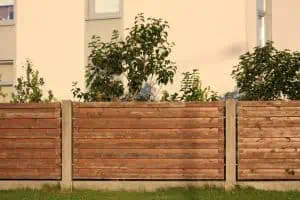How Long Does a Wood Fence Last?
When it comes to choosing a wood fence, it’s important to understand the factors that can affect its longevity. The type of wood, the type of installation, the environment in which it is installed, and how much care and maintenance it receives all contribute to how long a fence will last. Here are some tips on how to maximize the lifespan of your fence.
(Searching in Google “Chain Link Fence Service“? Contact us today!)

First, make sure to get a high quality exterior grade paint. This will limit the weathering of your wood. You’ll also want to use an opaque stain to protect your fence. While a transparent stain may be a good choice in some cases, the opaque version is likely to last longer.
Next, treat your wood to prevent rot and insect infestations. Fences that are made from cedar and pressure-treated woods are able to withstand moisture better than the untreated variety. It’s best to treat your wood at least once a year, especially if you live in a wet climate.
Once your wood has been properly treated, you can expect it to last about 15 years. It’s a good idea to check it for damage every couple of years, as well as to seal it every few years to help it last even longer. Also, be sure to clean it regularly to keep it looking its best. If you find dirt, moss, or other particles on your wood, use a pressure washer to remove them.
While you are at it, look for other signs that your fence needs attention. Cracks in the paint, damaged nails, and broken boards are all signs that it might need some TLC. Paint and stain can wear out quickly, so re-seal your fence before they do. Additionally, make sure to re-paint or stain your fence at the same time each year.
Another way to extend the life of your wood fence is to install a water guard. This will allow you to adjust the sprinklers so that the fence does not get wet. Water can be a big cause of rot and insect infestation, so keeping the area around the posts dry is a good idea.
In addition, be careful about using vines or bushes on your fence. These plants can add weight to your fence, making it more prone to rotting.
Another way to help your wood fence last is to use a UV-inhibiting coating. Wood is very porous, so a coat of UV-inhibiting paint or stain is a good way to prevent rot and pests. For optimal results, treat your wood every few years with a UV-inhibiting coating.
Finally, if you have a kiln-dried or kiln-finished fence, the longevity of your fence will be affected by the amount of time it takes to dry out. Freshly cut wood should dry out for about a year. However, if you live in an arid climate, your wood might dry out faster.
Depending on the size of your property and the quality of your fence, your fence might last for as little as five to twelve years. If you live in a wet climate, you might be able to extend your fence’s lifespan by at least three years.

